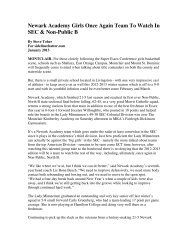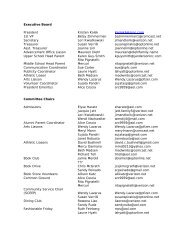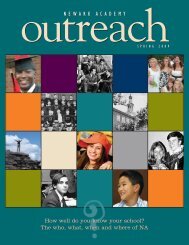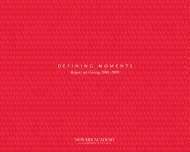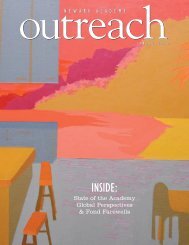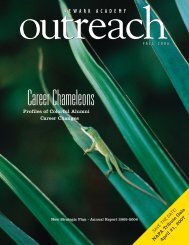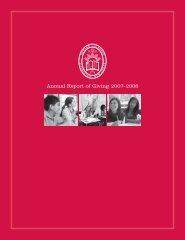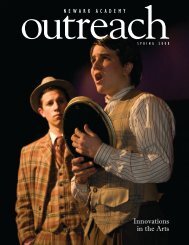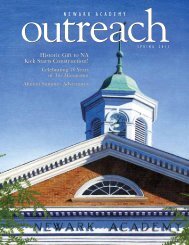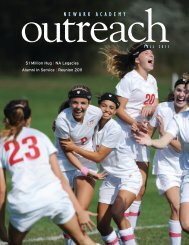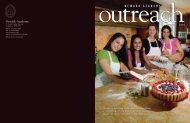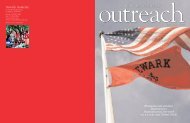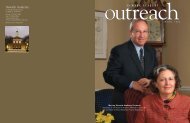Donald M.Austin - Newark Academy
Donald M.Austin - Newark Academy
Donald M.Austin - Newark Academy
Create successful ePaper yourself
Turn your PDF publications into a flip-book with our unique Google optimized e-Paper software.
The <strong>Austin</strong> family: George, Kiki, Don, Charlie and Ben<br />
studies are presenting our school with exciting challenges and opportunities.<br />
Our ability to make the most of these opportunities will help distinguish<br />
<strong>Newark</strong> <strong>Academy</strong> as a top-notch school.<br />
Technology has already reshaped the way we communicate and interact,<br />
and it is changing the way we can teach and learn.When I began my<br />
career in the early 1980s, there were virtually no personal computers<br />
or cell phones, in the classroom or in the home. My sons refer to my<br />
computer-less childhood as the Dark Ages.Today, nearly all of our<br />
classrooms are equipped with interactive white boards, and most of us<br />
seated here today have cell phones and PCs that are connected to the<br />
Internet for much of the day.The current level of technology seems<br />
“normal” to <strong>Newark</strong> <strong>Academy</strong>’s students, but to people of my generation,<br />
a lot has already changed.<br />
And yet many experts, including Thomas Friedman, the author of The<br />
World Is Flat, say that we have just entered the era in which technology<br />
will most transform our lives. Friedman cites Carly Fiorona, the former<br />
CEO of Hewlett Packard, who said in 2004 that the previous 25 years<br />
in technology had been a “warm-up act.” She asserted that the next 25<br />
years would be the “main event… an era in which technology will literally<br />
transform every aspect of business, every aspect of life, and every aspect of<br />
society.” Our goal as a leading school must be to remain flexible and<br />
forward looking, able to determine when and how to use technology as<br />
a communication tool and as a medium to facilitate learning.<br />
The interactivity of technology offers exciting ways to enhance our<br />
curriculum.The Internet has already opened up avenues for research, for<br />
example, that any student can<br />
access, provided he or she has<br />
certain skills; this capacity allows<br />
individualized learning to a greater<br />
degree than we have known and<br />
will offer significant possibilities<br />
for motivated, able students.<br />
At the same time, technology is<br />
creating opportunities for group<br />
experiences, by connecting our<br />
classrooms to realms that previously<br />
required field trips or elaborate<br />
research in university laboratories.<br />
Science students at <strong>Newark</strong><br />
<strong>Academy</strong> participate in a project<br />
knows as GLOBE in which they<br />
can monitor the environment by<br />
accessing scientific data via the<br />
Internet.This project creates<br />
the possibility for our students<br />
to compare their findings with<br />
scientists’ research, and it<br />
13



